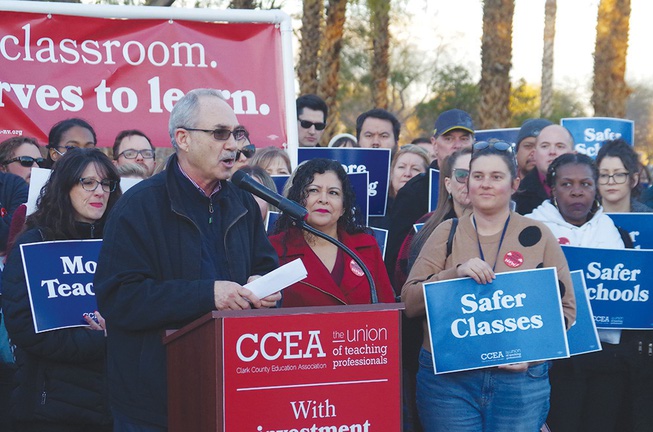
Hillary Davis
John Vellardita, executive director of the Clark County Education Association, leads a rally Monday, Feb. 6, 2023, outside the Grant Sawyer State Office Building in Las Vegas. Members of the state’s largest teachers union rallied for increased funding for Nevada public schools on what was the first day of the Nevada Legislature’s 2023 session.
Tuesday, Aug. 8, 2023 | 5:49 p.m.
The Clark County Education Association hit back at the Clark County School District in an emotionally charged court filing on Tuesday opposing the district’s motion to legally block what it argues is a threatened illegal teachers’ strike.
The teachers union said that a strike is not imminent, making the district’s suit premature, misplaced and legally inadequate.
“This court should end this politically-driven lawsuit at the earliest possible moment. That working people — public school teachers, unionized for the very purpose of negotiating their working conditions, their compensation, and their benefits for themselves and their families — have to expend their collective time, resources, and energy to responding to this concocted ‘emergency’ alleged by the district is ridiculous,” the filing stated.
CCSD sued CCEA in Clark County District Court on July 31, citing several comments made by union leaders and members that “work actions,” as CCEA Executive Director John Vellardita has phrased them, are possible if the union does not have a new contract by Aug. 26.
CCSD interpreted that as a threat to strike, which is illegal in Nevada for employees of local and state governments. The law also allows government employers to apply for injunctive relief — or getting a court to block an action — “if a strike is threatened against the state or a local government employer.”
In a press conference the day after CCSD filed its complaint, Vellardita said it was not a surprise that CCSD went to court to essentially “chill and persuade our bargaining efforts.”
Among other demands, CCEA seeks 18% across-the-board pay raises over two years; plus additional compensation for special education teachers; teachers in high-vacancy, typically low-income schools; and an increased pay rate for teachers working extended-day hours at certain campuses.
In its filing, CCEA also characterized CCSD’s complaint as “threadbare allegations and absurd hyperbole,” a “political attack,” “spurious,” “ill-conceived,” an “overwrought reaction to (a) handful of irrelevant statements,” and built on “thin allegations” and “cherry-picked quotes and a breathless false panic.”
“This whole charade is transparent,” the filing added. “The district is aggressively trying to chill the expression and deliberation of teachers, at a crucial moment in the bargaining process, and to stir dissent among the membership.”
CCSD’s complaint cited several instances of statements in recent weeks referencing actions that it says were “clearly amounting to a strike.” Among them:
At a July 29 news conference following a CCEA member meeting, Vellardita said there would be no contract agreement until CCSD funds salary increase by dipping into its share of significant recent state increases to education funding. And if there is no agreement by Aug. 26, union members will vote on whether to “engage in work actions.”
Vellardita did not, at that time, define “work action.” A reporter asked him if that means “strike.”
“We’re calling it work action today,” he said to cheers from union members.
In a radio appearance last month, Vellardita said that members have said “there’s not going to be a school year without a contract.” When Superintendent Jesus Jara sent out a staffwide email about the district’s proposed new pay schedule, a teacher replied with “We WILL have a contract, or you’ll be opening schools alone.” The school year started Monday.
The filing said that a “work action” can potentially mean working not a minute past the standard seven-hour, 11-minute contracted day, or engaging in “informational picketing.” Neither of these are strikes.
“With no concrete proposals from the district on the table, now six months after negotiations began and two months after expiration of the last labor agreement, CCEA members are absolutely right to question the district’s good faith in bargaining,” the filing alleged. “But instead of demonstrating the good faith that is its own solemn statutory obligation… the district comes to this court with anonymous tweets, press-conference snippets, and out of context statements, demanding an improper obey-the-law injunction against CCEA and its leadership, which Nevada courts do not permit.”
The district plans to again hold negotiations with CCEA on Aug. 17 and 18.
The document acknowledged that public schoolteacher strikes are illegal in Nevada, and said that CCEA officials have repeatedly expressed that in public. It also says that union leadership has used conditional language about “work actions” that union members have yet to vote on.
On the same grounds as its lawsuit, CCSD has also filed with the state Employee-Management Relations Board a petition to withdraw CCEA’s bargaining agent status as the representative for CCSD’s licensed professional employees.
“The Clark County School District does not take CCEA’s threats of illegal strikes or ‘work actions’’ lightly as our educators await a new contract,” the district said in a statement responding to today’s filing. “Nevada law is crystal clear that a strike or a threat of a strike or work stoppage is unlawful and is grounds for withdrawal of recognition as the bargaining agent of a local government employee group. To protect our students and their families, we took the necessary steps to ensure the ongoing operations of ensuring students receive the education they deserve.
“Negotiating occurs at the bargaining table, not in public. CCEA’s continued threats do not move the parties closer to reaching a new agreement and are a disservice to the District’s students, parents, and staff.”
[email protected] / 702-990-8959 / @HillaryLVSun
